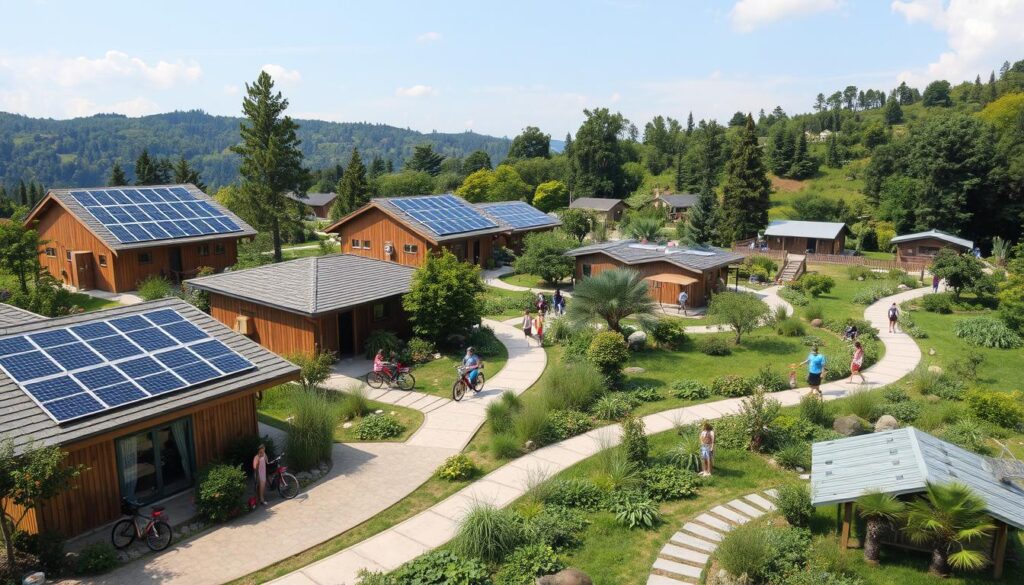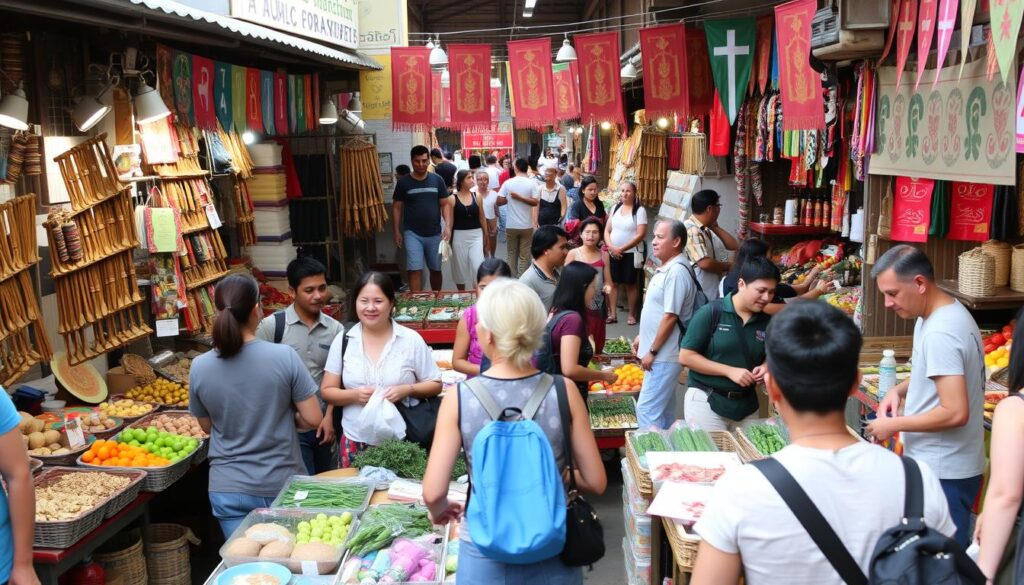תיירות רצינית היא יותר ממגמה. זו הדרך המרכזית לראות את העולם תוך שמירה על יופו לדורות הבאים. הרעיון הזה מדגיש את הצורך בבחירות נסיגות שמתייחסות בחביבות לסביבה ולאנשים המקומיים.
על ידי בחירה לטייל באופן אחראי, אנו יכולים ליהנות מחוויות מדהימות מבלי לפגוע במקומות שבהם אנו מבקרים. המועצה הגלובלית לתיירות רצינית (GSTC) תומכת בעקרויות המגנות ומשפרות את חיי הקהילות המקומיות. על ידי נסיעה ירוקה, אנו מבטיחים שפלאי העולם יישארו זמינים לחוקרים בעתיד.
מסקנות מרכזיות
- תיירות רצינית היא חיונית לשמירה על הסביבה והתרבות.
- פרקטיקות תיירות אחראית משפרות את רווחת הקהילה המקומית.
- פתרונות לנסיעות ידידותיים לסביבה משתתפים במאמצי שמירה.
- ארגונים כמו GSTC מציעים הנחיות יקרות לפרקטיקות רציניות.
- המטיילים מחזיקים בכוח להשפיע חיובית על הקהילות דרך הבחירות שלהם.
חשיבות התיירות המתוקננת
התיירות המתוקננת מתמקדת בנסיעות שטובות לטבע ולקהילות. זה אומר לטפח את הסביבה ואת המסורת המקומית. ככל שאנשים לומדים יותר, הם מבינים כמה חשוב לטייל באופן אחראי.
הבנת התיירות המתוקננת
התיירות המתוקננת היא כל כך על עזרה לטבע, לחברה ולכלכלה. זה משלב תרבות מקומית ומשאבים בדרך שונה מהנסיעה הרגילה. המטיילים נהנים מחוויות ייחודיות שמחברות אותם בעומק למקומות, מבטיחות שהמקומות האלה יחזיקו לאורך זמן.
דרך זו של נסיעה מעלה באנשים לחשוב על השפעתם על המקומות שהם מבקרים. זה הולך מעבר לכך לפשוט לצחוק במקום מסוים.
השפעה על הסביבה והקהילות
התיירות יכולה להשפיע בצורה משמעותית על מקומות, מציעה תוצאות טובות ורעות כאחד. הרגלי תיירות רעות גורמות לזיהום ולפגיעה בדרכי החיים המקומיות. מצד שני, נסיעה מתוקננת עוזרת לשמור על אקוסיסטמות ועל תרבויות.
על ידי הטיול בצורה מתוקננת, המבקרים משפרים את חיי האנשים ששוהים שם. הם עוזרים לעסקים מקומיים ושומרים על כדור הארץ.
מהן פתרונות התיירות המתוקננת?
פתרונות תיירות מתוקננת מתמקדים בשמירה על הסביבה תוך תמיכה בכלכלה המקומית. המטיילים עוזרים להגן על יעדים ולתמוך בקהילות על ידי בחירת אפשרויות נסיעה מתוקננות. הבנת השיטות הללו היא מרכזית למי שרוצה ליצור עשייה חיובית.
הגדרת שיטות מתוקננות בנסיעות
התיירות המתוקננת פועלת להפחתת נזקים סביבתיים. היא כוללת:
- הפחתת פסולת על ידי שימוש בפריטים חוזרים.
- קידום שמירה דרך מאמצים להגנה על חיות הבר.
- תמיכה בכלכלות מקומיות על ידי גיוס מדריכים מקומיים ורכישת מוצרים מקומיים.
דוגמאות לפתרונות תיירות מתוקננת
שיטות ידידותיות לסביבה הופכות את הנסיעה לקיימת ומעשירות אותה. הנה כמה דוגמאות:
- בחירת תחבורה ידידותית לסביבה כמו אופניים, תחבורה ציבורית או רכבים חשמליים.
- שימוש באנרגיה מתחדשת במקומות שבהם אתה שוהה, כגון סולארי או כוח רוח.
- השתתפות בתיירות מבוססת על קהילה מועילה למקומיים ישירות מהתיירות.

| פתרון | תיאור | יתרונות |
|---|---|---|
| תחבורה ירוקה | בחירת אוטובוסים, רכבות או אופניים לנסיעה | מוריד את פליטות הפחמן |
| אירוח ירוק | בחירה במלונות המשתמשים באנרגיה מתחדשת | תומך בעסקים ידידותיים לסביבה |
| עיסוק בקהילה המקומית | הצטרפות לסיורים עם מדריכים מקומיים | מעלה את הכלכלה המקומית |
בחירת אירוחים ידידותיים לסביבה
יותר נוסעים כיום מתייחסים להשפעתם הסביבתית כאשר בוחרים איפה לשהות. הם מחפשים מקומות שתומכים בקיימות. זה עוזר להם לטייל באופן אחראי.
זיהוי מלונות ירוקים ומקומות לינה
כאשר מחפשים מלונות ירוקים, נוסעים יכולים לבדוק תעודות מסוימות. תוכניות כמו LEED ו-Green Key מראות על המחויבות של המלון לסביבה. תעודות אלה אומרות שהמלון הגיע לרמות גבוהות של קיימות. כיום, כרבע מהנוסעים מעדיפים מקומות ידידותיים לסביבה במהלך הטיולים שלהם.
יתרונות של שהייה במקומות אירוח קיימים
בחירת אירוח ידידותי לסביבה מפחיתה את הגלגל הסביבתי שלך. זה גם עוזר לקהילות המקומיות מבחינה כלכלית. כמה מהיתרונות של אירוח קיימים כוללים:
- מאמצים משופרים לשמירה על הסביבה.
- תמיכה בכלכלות מקומיות דרך יצירת עבודה.
- שיפור באיכות החיים של התושבים על ידי החזקת משאבים מקומיים.
- קידום שיטות תיירות בר-תוקף המעניקות חינוך לאורחים.
קבוצות כמו EarthCheck ואיגוד המלונות הירוקים מדגישות את חשיבות בחירת אירוח ידידותי לסביבה. על ידי בחירת האירוח הזה, אנו מראים תמיכה בקיימות. זה עשוי להשרות אחרים לעשות אותו הדבר.

| אישור | פרטים | יתרונות |
|---|---|---|
| LEED | אישור בנייה ירוקה מוכר ברחבי העולם. | מפחית צריכת אנרגיה ומים. |
| Green Key | תו אקולוגי המוענק למלונות המציגים התמדה לקיימות. | מקדם יוזמות לקיימות מקומיות. |
| EarthCheck | מספק בנקים למדידת ביצועים ואישור לתיירות קיימת. | מעודד שיפור רציני בפרקטיקות לקיימות. |
תמיכה בכלכלות מקומיות
כאשר אתה נוסע, יש לך הזדמנות מיוחדת לעזור לכלכלות מקומיות. כל פריט שאתה קונה וכל אדם שאתה פוגש עוזר לקהילה לצמוח ולשמור על תרבותם. תמיכה בעסקים מקומיים מאפשרת לך לחוות חוויות אמיתיות ומעודדת תיירות טובה.
למה כדאי לך לקנות מקומי
קנייה מקומית היא נהדרת לטיול שלך ועוזרת לקהילה לפרוח. הנה למה זה חשוב:
- שיפור דרגת החיים בקהילה: להוציא כסף במקום מקומי משמר אותו בקהילה. זה תומך בשירותים ציבוריים ותשתיות.
- חוויות תרבותיות ייחודיות: לפגוש מוכרים ואמנים מקומיים נותן לך מבט לתרבותם והיסטוריה.
- יתרונות סביבתיים: רבים מהחנויות המקומיות משתמשות בשיטות ידידותיות לסביבה. זה אומר פחות זיהום מההובלה של סחורות.
התעסקות אחראית עם עסקים מקומיים
כדי להפוך את הטיול שלך לא נשכח, תתקשר עם עסקים מקומיים. הנה כמה דרכים לטייל באופן אחראי:
- קנה בשווקים מקומיים כדי לקנות פריטים מעוצבים בעבודת יד. זה עוזר לאמנים המקומיים ומציג את התרבות של האזור.
- לאכול במסעדות משפחתיות כדי לטעום אוכל מקומי אמיתי. זה גם תומך בכלכלה ישירות.
- הצטרף לסיורים בהובלת מקומיים. הם מציעים תובנות נדירות וסיפורים על המקום.

| סוג עסק מקומי | יתרונות תיירות מקומיים | שיטות תיירות אחראית |
|---|---|---|
| שווקי אמנות | תמיכה באמנים וספק זיכרונות ייחודיים. | עידוד לשימוש בחומרי גלם מתוקשרים. |
| מסעדות בבעלות משפחתית | הצעת מטבח מקומי וטעמים אותנטיים. | שימוש ברכיבים מקומיים. |
| סיורי קהילה | קידום הבנת עמוקה יותר של התרבות המקומית. | קידום פגישות עם חיות וטיפול בסביבה באופן אחראי. |
אפשרויות התחבורה עבור נוסעים אחראיים
תכנון טיול כולל חשיבה על איך לנסוע בצורה בר-תועלתית. התחבורה הציבורית היא בחירה נהדרת. היא יורדת את הפליטות ומפחיתה את התנועה. ערים כמו טוקיו ופריז מציעות תחבורה ציבורית נהדרת שקל להשתמש בה. היא עוזרת לנוסעים להשפיע פחות על הכדור הארץ. אף על פי שרכבים פרטיים עשויים להיראות נוחים, הם פוגעים בסביבה יותר.
התחבורה הציבורית נגד רכבים פרטיים
התחבורה הציבורית יכולה להעביר הרבה אנשים ביעילות. היא מורידה את הפליטות הפחמימות לכל אדם. והיא מאפשרת לנוסעים להתחבר לסגנונות החיים המקומיים. אך, השירותים שונים, לכן חכם לבדוק את האפשרויות המקומיות לפני שאתה יוצא. אם עליך להשתמש ברכב פרטי, חשוב לחשוב על שיתוף נסיעה. או לבחור ברכב היברידי או חשמלי כדי להיות ידידותי יותר לסביבה.
תוכניות פיצוי פליטות פחמימה עבור טיסות
בטיסות, ניתן לפצות פליטות דרך תוכניות ספציפיות. ארגונים כמו MyClimate ו-CarbonFund.org משקיעים באנרגיה נקייה ושמירה על יערות. זה עוזר לבטל את הזיהום מהטיסות שלך. הצטרפות למאמצים אלה הופכת את הנסיעה שלך לידידותית לסביבה יותר. זה גם תומך בפעולה ברחבי העולם נגד שינויי אקלים. הוספת פיצויי פליטות לתוכניות שלך היא צעד חכם למען הכדור הארץ.

